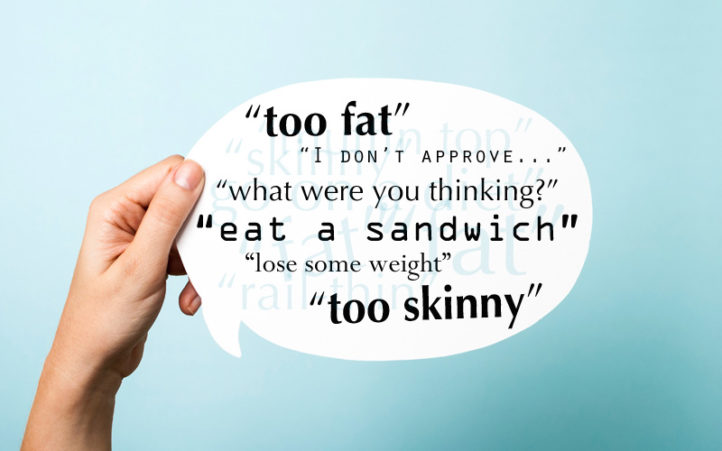It is increasingly the case that criticism – even if completely legitimate – is being denounced as “shaming”. The most obvious example is the viral use of the term “body shaming”. To label a particular body type as too fat, or too thin, etc., is to demean those with that body type, to belittle them.
Obviously criticism can be motivated by a desire to make fun of the person whose appearance is being criticised. But it is quite frankly stupid to label all criticisms of body types (unless it’s personalised) as nothing other than “shaming”, as nothing other than attempts to make fun of people. Such a labelling entails that all criticism and even all advice is illegitimate, no matter how rational the advice is and no matter how justified the criticism is.
So to say that obesity and anorexia are unhealthy is to say something true and evidence based. Moreover, saying this is very usually motivated by a concern for those people who are obese or anorexic – the very opposite of a belittling attitude. In fact, to refrain from saying that obesity and anorexia are unhealthy is to show more concern for appearing non-judgmental than for those affected by these conditions: one prioritises one’s “tolerant” reputation over and above the welfare of others.
Other types of “shaming” are in vogue. “Formula shaming” is directed against any advice to the effect that breastfeeding is good both for baby and for the mother-baby relationship. If one rejects this advice one ought to have good reasons for that decision – it is not good enough to say that the advice is motivated by animosity towards women who don’t breastfeed and therefore ought to be ignored.
“Slut shaming” is a catch-cry of hard-left feminism. The idea is that any criticism of having multiple sexual partners or any advice that cautions against this is given only in order to demean. But the advice will often have a sound basis in reason and empirical science: promiscuity involves treating other people’s bodies as mere means to one’s sexual gratification – it is itself demeaning. It is also linked with an increased likelihood of contracting an STI; difficulties in forming stable, long-lasting relationships; increased likelihood of a child being conceived who will be aborted; and so on.
The proliferation of “shaming” terms in public discourse requires an explanation. It has little basis in common sense. I think the following explanation has some truth to it. We live in a deeply individualistic culture which, paradoxically, is also deeply insecure. This insecurity is party explained by the loss of faith in an ultimate meaning to existence, a loss of faith that motivates a retreat into the individual. The insecurity is particularly sensitive to suggestions that one might be in error in some way. After all, how can I be in error when I’m the sole author of the rules I’m to live by? Rational criticism is a threat to the self-enclosed and self-satisfied individual, it leaves them vulnerable to an outside world whose ultimate meaning (or lack of) presents an uncomfortable challenge.

















